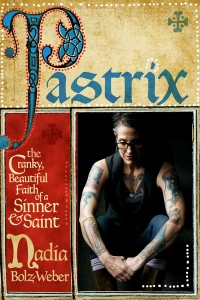 I’m a little late here in terms of weighing in on the craze here. Every other theology blog on the internet seems to either be raving or raging over Nadia Bolz-Weber’s new book Pastrix: The Cranky, Beautiful Faith of a Sinner & Saint, which means I’m just piggybacking on their blog hits at this point. And you know what?
I’m a little late here in terms of weighing in on the craze here. Every other theology blog on the internet seems to either be raving or raging over Nadia Bolz-Weber’s new book Pastrix: The Cranky, Beautiful Faith of a Sinner & Saint, which means I’m just piggybacking on their blog hits at this point. And you know what?
I don’t care. It’s a damn good read.
“Wait a second, Pat. What the heck are you talking about? What blogs are talking about some book with some fancy lettering and a tattooed middle-aged woman on the front? Who the heck is Nadia Bolz-Weber? Why should I care?”
I’ll tell you who, and I’ll tell you why. Now sit down and shut up.
Nadia Bolz-Weber is a Lutheran Pastor out in Denver Colorado who runs a church called The House for All Sinners and Saints which, while still sticking to the ancient liturgy of the church, also works in new, innovative and creative ways for all people to participate in church. Wanna know more? That’s their website up there. Go check it out.
Anyway, Nadia. The book itself focuses on her personal journey away from one church, through alcoholism, “intentional” communities, recovery, and eventually seminary. Insights, hilarity, somber tones, and an overabundance of profanity run rampant through this autobiography/autohagiography (Lutheran theology places Christians both as sinner and saint). I must admit to some initial skepticism; stories of turning from addiction to redemption are pretty common in evangelical (and I’m sure mainline as well) circles, to the point where they’re becoming pretty trite. While I’m happy to see someone sober up and turn their lives around, they always turned into this whitewashed version of their former self, never swearing, ashamed of their tattoos, their former lives, and just trying to convince people that they’re this borderline fundamentalist Christian who hates abortion and gays and believes in the “wonder-working power of the blood,” then hold an altar call for others to be like them.
Yeah…Nadia’s not like that. From the time she’s a youngster to the present (in the broken up timeline of the book), she remains this spunky, sarcastic, foul-mouthed, progressive person…she just adds Jesus and subtracts alcohol. Obviously it’s more complicated than that, but if I reveal much more, you’ll take this summary and not read her book!
In all seriousness, this is without a doubt one of the realest people whose books I have ever read. I felt like Nadia was sitting across from me telling me the story as I read, with all the grittiness and honesty I would expect from her. I loved it. It’s also worth admitting that this has me a little interested in Lutheran theology. If the ELCA can make room for the radical progressiveness of House For All Sinners and Saints, it sounds like something right up my alley. Perhaps it’s worth checking into.
I got way more out of this book than just Nadia, though. By relating her personal experiences to some pretty solid theology, Pastrix teaches the reader so much about themselves, something few memoir’s are capable of doing. You might relate to a memoir, but rarely do you say, “THAT MAKES SO MUCH SENSE I FEEL LIKE I HAVE BEEN THINKING THIS ALL ALONG AND BEEN TO SCARED TO ADMIT IT OMG!” when reading them. Pastrix does that, and does it well.
Just go read the book. It’s awesome.